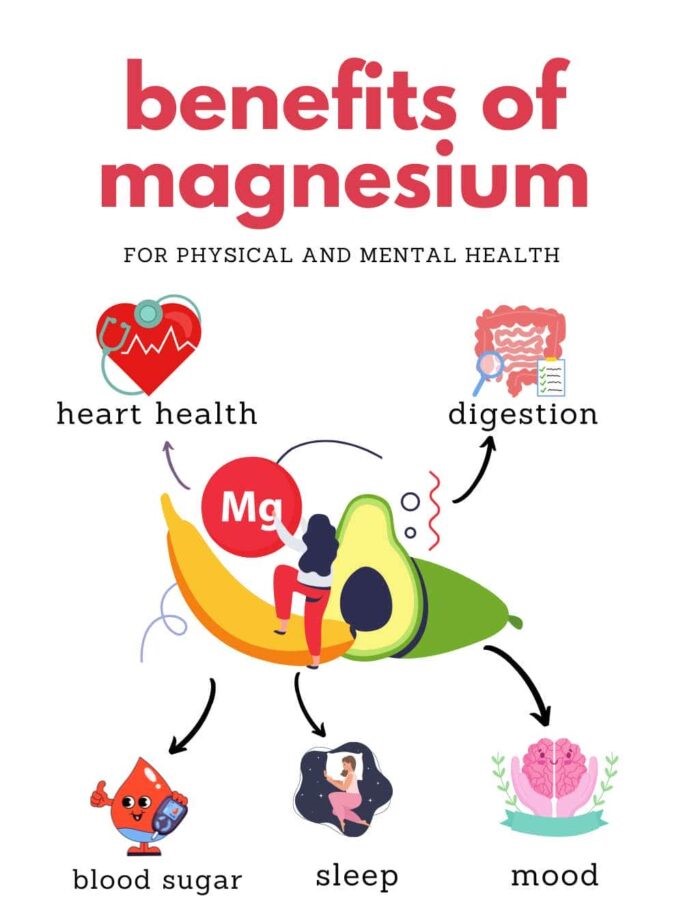In our fast-paced and hectic modern lives, maintaining good mental health and sleep have become pressing challenges for many individuals. Stress, anxiety, and sleep disturbances have become all too common, affecting our overall well-being and productivity.
While various approaches are available to address these issues, one often overlooked, and yet incredibly effective remedy is magnesium. This essential mineral plays a crucial role in promoting mental health and improving sleep quality, making it a powerful ally in our pursuit of well-being.
The Role of Magnesium in Mental Health:
- Stress and Anxiety Reduction: Magnesium is involved in the regulation of the stress response system in our bodies. It helps to lower the levels of cortisol, the primary stress hormone. By doing so, magnesium can mitigate the physiological and psychological effects of stress, leading to a calmer and more balanced mental state.
- Mood Enhancement: Research has shown a positive correlation between magnesium intake and improved mood. Magnesium aids in the activation of neurotransmitters like serotonin, which plays a crucial role in regulating mood and emotions. Adequate magnesium levels can contribute to a more stable and positive outlook on life.
- Brain Function and Cognitive Health: Magnesium is vital for proper brain function, as it supports synaptic plasticity and neurotransmitter release. This mineral has been linked to better memory, learning, and cognitive performance. Maintaining adequate magnesium levels may help prevent cognitive decline and support overall brain health.
- Depression Management: Some studies suggest that magnesium supplementation may be beneficial in managing depression symptoms. Although more research is needed in this area, magnesium’s potential role in promoting a healthier emotional state offers promising avenues for future mental health treatments.

Magnesium’s Impact on Mental Health and Sleep Quality
- Relaxation and Sleep Initiation: Magnesium has muscle relaxant properties, which can help calm the body and mind, making it easier to fall asleep. It enhances the activity of the neurotransmitter GABA, which has a calming effect on the central nervous system, leading to a more relaxed state conducive to sleep.
- Regulating Sleep Cycles: Magnesium is known to influence the body’s internal clock and circadian rhythm. By supporting the production of melatonin, the hormone that regulates sleep-wake cycles, magnesium can aid in maintaining a healthy sleep schedule and improving sleep quality.
- Alleviating Restlessness: Restless leg syndrome and nocturnal leg cramps can significantly disrupt sleep. Magnesium’s muscle relaxant properties can alleviate these symptoms, allowing for a more restful and uninterrupted night’s sleep.
- Fighting Insomnia: Insomnia, a common sleep disorder, can be exacerbated by stress and anxiety. As mentioned earlier, magnesium’s role in stress reduction can indirectly help combat insomnia by promoting relaxation and mental calmness.
How to Incorporate Magnesium into Your Routine:
To reap the benefits of magnesium for mental health and sleep, consider the following steps:
- Dietary Sources: Include magnesium-rich foods in your diet, such as leafy green vegetables, nuts, seeds, whole grains, and legumes.
- Supplements: If your diet is insufficient in magnesium, consider taking magnesium glycinate supplement at bedtime.
- Topical Application: Magnesium oil or lotions can be applied to the skin, providing a direct and easily absorbable source of the mineral.
- Relaxation Techniques: Combine magnesium intake with relaxation techniques like meditation, deep breathing, or yoga to enhance its effects on stress reduction and sleep quality.
- Epson Salt Bath: The absorption of magnesium through the skin during these Epson salt baths can contribute to improved overall well-being and mood stability. Epson salt is chemically know as magnesium sulfate.
The benefits of magnesium for mental health and sleep cannot be underestimated. This unassuming mineral offers a multifaceted approach to promoting well-being, from reducing stress and anxiety to improving sleep quality and managing mood disorders. By incorporating magnesium into our daily routines, we can take a significant step toward achieving a healthier mind and body, allowing us to navigate life’s challenges with greater ease and vitality.
Are you looking to reduce depression and improve sleep holistically? Schedule a consultation with one our integrative psychiatrist or our holistic mental health practitioner could help you today.


